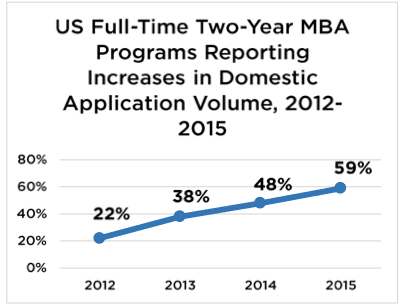The Graduate Management Admission Council (GMAC) have released the findings of their 2015 Application Trends Survey, revealing that the majority of full-time MBA programs report increases in application volume.
2015 saw significant increases with 51 per cent of one-year programs reporting increased volume compared to just 37 per cent last year and two-year programs reporting a 57 per cent increase. All MBA programs are performing better than compared to 10 years ago with 60 per cent of two-year and 53 per cent of one-year programs reporting increases this year than when compared with 2005.
“This is positive news and reflects a strong full-time MBA market,” said Bob Alig, GMAC’s executive vice president for school products.
“The full-time MBA continues to be a sought after credential because graduates consistently see a high return on their investment – not only in terms of earnings, but also in job satisfaction and personal fulfilment.”
The GMAC survey shows an overall positive turnaround for the U.S market, particularly for the two-year programs, with year-on-year growth hitting 59 per cent.
The share of women in the MBA applicant pool has also increased over the past five years, increasing between three and eight percentage points, with the exception of a Master of Accounting which still sees women maintaining the majority at 57 per cent.
More than half of the following programs report growing application volume for women this year: full-time two-year MBA – 51 per cent, full-time one-year MBA – 50 per cent, executive MBA- 50 per cent, online MBA – 55 per cent, Master in Management – 55 per cent, Master of Finance – 56 per cent, and Master of Marketing and Communications – 60 per cent.
The report revealed that business schools were conducting targeted outreach for women with 67 per cent of two-year MBA programs doing so. It also showed that it was conducted by 41 per cent of part-time MBA programs and 51 per cent of executive MBAs.
“GMAC is pleased to see that business schools’ efforts to increase the volume of applications from women seem to be succeeding,” Mr Alig said.
A number of trends have also appeared out of the report with full-time two-year MBA programs extremely popular in the Asia-Pacific region, with a 90 per cent increase in volume. Full-time one-year MBA programs however, saw decreases in 60 per cent.
In general, a greater share of online and flexible MBA programs have reported growth when compared with part-time and executive MBA programs. It’s suggested that this trend may be related a shift in employer tuition assistance programs, as this year both part-time and executive MBAs expect fewer incoming students to have employer financial backing, whereas it’s expected that online MBA programs will be receiving increased funding.
To view the full 2015 Application Trends Survey visit www.gmac.com/applicationtrends









